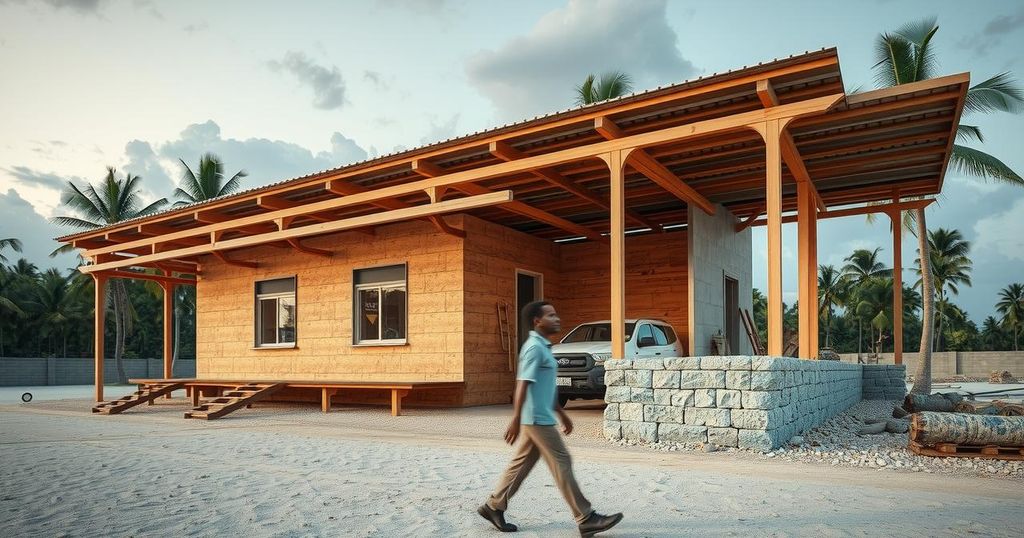Mozambique has begun constructing resilient shelters for victims of Cyclone Chido, which recently caused significant destruction, killing at least 70 and injuring 600 individuals. The government, supported by international partners, aims to improve housing standards to withstand future storms amidst warnings of additional severe weather during the rainy season. The cyclone’s impact has heightened concerns over the ongoing cholera outbreak and the extensive damage to critical infrastructure.
Mozambique has commenced the construction of shelters for the victims of Cyclone Chido, which recently devastated three northern provinces of the country, resulting in the loss of at least 70 lives and injuring approximately 600 individuals. Trade and Industry Minister Silvino Moreno emphasized the government’s efforts to aid storm-affected communities during a visit to Nampula, one of the hardest-hit areas. The government aims to utilize resilient materials for housing construction to better withstand future storms, recognizing that many existing homes, primarily built of mud and reeds, were insufficient to endure the cyclone’s intensity.
Prior to impacting Mozambique, Cyclone Chido had already wreaked havoc in Mayotte, significantly damaging infrastructure and posing heightened risks to vulnerable populations, including refugees. The storm further affected southern Malawi, where strong winds and rainfall disrupted infrastructure and housing. Mozambique’s meteorological agency has warned residents to prepare for further storms throughout the rainy season, which lasts for another three months, urging improved readiness for impending adverse weather conditions.
UNICEF has reported that the cyclone has affected at least 174,000 individuals, with ongoing assessments suggesting this number may continue to rise. The devastation extended beyond homes, as thousands of classrooms and twenty health facilities were damaged. Local UNICEF field office head, Michael Chimedza, revealed that the organization has mobilized resources to provide immediate assistance to 50,000 affected individuals and is prioritizing response training at the community level. Across the affected provinces of Nampula, Cabo Delgado, and Niassa, over 25,000 families have lost electricity, and critical infrastructure, including health units and roads, has been compromised. Humanitarian efforts are crucial, particularly in light of an existing cholera outbreak, which the cyclone’s aftermath threatens to exacerbate.
The impact of Cyclone Chido has revealed the vulnerabilities of Mozambique’s infrastructure and housing, particularly in regions prone to extreme weather events. Frequent storms are exacerbated by the seasonal rainy period, highlighting the need for improved construction practices and preparedness strategies. The ongoing humanitarian crisis, compounded by health risks such as cholera outbreaks, necessitates immediate aid and long-term planning to enhance community resilience against future natural disasters. Historically, Mozambique has been affected by several cyclones, emphasizing the urgency for better response mechanisms and robust infrastructure development to protect its citizens.
In summary, Mozambique is taking essential steps to address the aftermath of Cyclone Chido by constructing durable shelters for affected citizens. The extensive damage caused by the cyclone underscores the need for better construction practices and preparedness against future storms. As local and international agencies mobilize support, the urgency for immediate assistance and long-term strategies to bolster infrastructure resilience remains paramount for preventing further humanitarian crises.
Original Source: www.voanews.com







